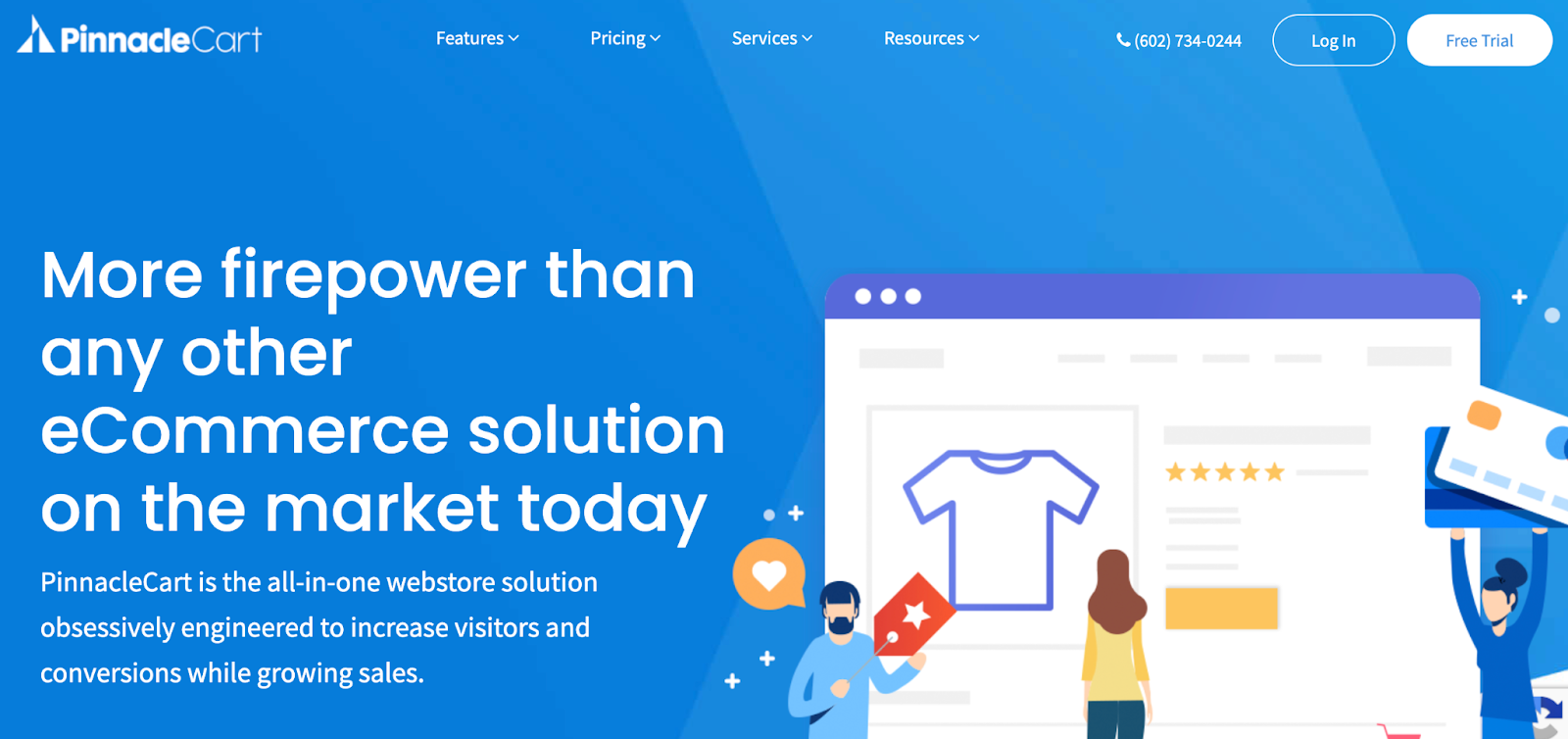12 Shopify Alternatives That Are Superior (Free + Paid) in 2025
Last updated: December 12, 2024
Shopify is a popular ecommerce platform used by millions of merchants. But a few drawbacks turn people off from staying on the platform. Many merchants churn due to the expensive monthly subscription, especially when their store isn’t profitable yet. Others leave because too many other costs like app purchases creep up and eat away at profit margins. And some find the site too complicated, especially for beginners. So, while Shopify may be an excellent platform for some, it’s always a good idea to look at some Shopify alternatives to make sure you’ve chosen the right ecommerce platform for your needs as a business owner. So, let’s get a closer look at some Shopify competitors.
What is Shopify?
Shopify is an ecommerce platform that specializes in selling physical products. Whether you dropship or wholesale, you can find Shopify apps that allow you to find products to sell on your store so that you can become an online merchant the same day. Shopify offers ecommerce features, such as web hosting, a free domain on their subdomain, over 100 payment gateways, unlimited products, and more. But there’s no free plan, only a 14-day free trial, so this endeavor can cost quite a bit early on.
4 Reasons to Use Shopify Competitors Instead
1. To find a more affordable option
Out of their traditional pricing tiers, Shopify’s most affordable plan is its Basic plan, which starts at $29/month. However, Shopify also offers a $9/month plan, but you won’t have your own online store; you’ll need to sell products via social media, a third-party website, or another method. Unfortunately, Shopify doesn’t offer an affordable plan for merchants who haven’t generated revenue. With the cost of themes, a monthly subscription, apps, and marketing, you’ll be investing a lot of money into getting started, with no guarantee that you will choose the right niche or products to sell. Unfortunately, not everyone builds a brand as big as Kylie Cosmetics or Fashion Nova. And so, Shopify alternatives can be a great choice for people looking for a more budget-friendly plan.
2. To earn a larger profit
Another reason people may look towards Shopify alternatives is to earn a more significant profit margin when selling online. In addition to the monthly subscription, you have monthly app fees, and transaction fees of 2.9% + 30 cents on the Basic plan. Depending on where you source your products, you may have to pay for shipping, product costs, and the app subscription. And that’s all before you start marketing your products. With so many fees being taken before making your first few dollars, it can eat away at your margins. So, you start advertising, which has a higher marketing cost than other forms of marketing to get sales. But ads don’t always convert profitably. It takes trial and error, product-market fit, and experience to successfully run an ecommerce store. These costs can quickly overwhelm beginners who simply want to make some additional money on the side. It’s not impossible to succeed, but some ecommerce platforms require too many upfront costs, which can hurt someone financially.
3. To find an easier platform
Shopify has drag-and-drop functionality, which makes the platform relatively easy for beginners. However, building a website isn’t the most challenging part of running an online store. Marketing your products is the hardest part of being an online store owner. The number of ecommerce features a platform offers is always a bonus, but the marketing features matter. Having a way to connect to your target audience faster and efficiently is what many ecommerce platforms fail to account for. However, it is possible to find an ecommerce solution that also acts as a marketplace so that customers come to you instead of you doing a lot of the heavy lifting. And for store owners looking for a good marketing platform, a Shopify alternative might be a good fit.
4. To ease your frustrations
From having to write hundreds of product descriptions to challenges with transferring from one platform to the next, to a lack of a quality content management system (CMS), to too many costs, there are several reasons why someone would look for a Shopify alternative. An ecommerce store is not just a website; it’s a business. The easier it is to run your business instead of just creating it, the more likely people will choose the platform that works best for them. Shopify offers customer support to all its merchants, but for some people, that’s not enough to help them generate sales.
12 Shopify Alternatives That Are Superior (Free + Paid)
1. Payhip
Shopify alternatives like Payhip allow you to create an online store to sell digital products. Digital products are a great way to keep product costs down since you can usually design them yourself. For example, you can sell software, downloadables, ebooks, courses, memberships, coaching services, songs, videos, and any other digitized product.
On Payhip, you can accept sales from anywhere. So if you want to sell on social media, your blog, or another website, you can. Payhip’s checkout is optimized for conversions, so you convert better on your store. Plus, when customers order from you, they’ll receive an Instant Download. You can finally say goodbye to long shipping wait times.
Payhip securely hosts your content files, and they’ll only receive the file once they’ve landed on your download page after purchase. Plus, unlike some of those big ecommerce platforms, you won’t need to wait to get paid. Instead, Payhip users earn income from PayPal or Stripe instantly.
This ecommerce platform also has a range of marketing features that will help you generate the sales you need to succeed. For example, you can run an affiliate program, offer coupons, send emails, offer pay-what-you-want pricing, and more.
But the best thing about Payhip as a Shopify alternative is that there is a Forever-Free plan with only a 5% transaction fee but no monthly subscription. You won’t need to pay anything if you haven’t made money. This is the ideal online store builder, especially if you’re a beginner looking to keep your costs low.
2. BigCommerce
Shopify alternatives like BigCommerce are also great for building an online store. BigCommerce offers a range of features, such as web hosting. But the best advantage BigCommerce has over Shopify is that there are no transaction fees on their pricing plans. BigCommerce allows you to add up to 600 variations for every product, whereas Shopify only allows 100 variations per product. BigCommerce also offers a longer free trial period than Shopify to enable you to explore the platform and build your online store. BigCommerce also has a more extensive drag-and-drop functionality that allows you to design your store with any page element easily. BigCommmerce also has more free themes and paid themes than Shopify does, making this one of those Shopify alternatives to check out.
3. WooCommerce
Shopify alternatives like WooCommerce are ideal for those looking to build an online store with maximum customization functionality. If you’re serious about building an ecommerce business, WooCommerce is an open-source platform, making it free to use. Plus, WooCommerce is a WordPress plug-in. So, if you’ve been planning to build out your website to have a massive blog on it to drive organic traffic, this is the best Shopify alternative to do that. You’ll need to pay for your own web hosting, though. But that also means you have the freedom of choice. WooCommerce is one of the biggest Shopify competitors as it has over 3,000,000 customers than the green shopping bag.
4. Etsy
If you’re looking for marketing features, Etsy is one of the Shopify alternatives to check out. Etsy is an online marketplace where people can buy and sell products. While you don’t own your online store, customers will find you organically when searching through Etsy, so it’s convenient for those struggling with marketing. There’s no monthly subscription, but that doesn’t mean Etsy is fee-free. You’ll need to pay listing fees of $0.20 for every product you add and a 6.5% transaction fee. Plus, you’ll be required to pay payment processing fees depending on the chosen payment provider. But considering you won’t need to dish out much for marketing costs, it’s a worthy Shopify alternative for those selling physical products.
5. PinnacleCart
Unlike Shopify, PinnacleCart offers a free plan for users earning up to $250,000. You can add up to five admin accounts on this free plan too. This ecommerce platform is stacked with over 400 ecommerce features, allowing you to customize and design your online store your way. They offer zero transaction fees on all of their plans. Shopify alternatives like this offer a QR code generator, testimonials feature, a wish list for customers, and even gift messaging for orders. And you don’t need to install an app to have those features on your ecommerce store.
6. Wix
Wix is one of the only Shopify alternatives that include ad vouchers in their monthly subscription so that you can run your online store and focus on what matters: getting sales. You can run subscription services on your Wix account, making it one of the advanced features online retailers can add to their stores. Your ecommerce business can also allow you to install up to 250 products when dropshipping via Modalyst. Beyond product sales, ecommerce solutions like Wix will enable you to build personal websites, freelance businesses, and even sell tickets for events. Restaurants often use Wix because it allows online orders for food. And hotels can book reservations through Wix as well. So it goes a bit beyond just building your online store.
7. PrestaShop
Another Shopify alternative that uses an open-source ecommerce platform is PrestaShop. As an open-source and self-hosted solution, it’s free to use for online stores. But there are still associated business expenses with running online stores, even with ecommerce solutions like PrestaShop. Nevertheless, this platform is easy to use and allows store customization. You can edit all source files, whereas on Shopify editing your theme’s code can make your online business ineligible for future upgrades. PrestaShop also has over 2,000 templates on their website, whereas Shopify has less than 100.
8. Elementor
The ecommerce solution Elementor is a Shopify alternative to consider. With over 300 professionally designed templates, you’ll be able to have a stunning online business. This Shopify alternative also allows you to do responsive editing, meaning you can adjust your site from up to seven different devices simultaneously. You can also live edit your website for quick fixes. Plus, with auto-save, you won’t need to update your website manually as you make changes to it. Also, unlike Shopify, you can build multiple pages, such as landing pages, pop-up templates, block templates, about us pages, and more with distinct design elements.
9. Square
Shopify alternatives when it comes to point-of-sale systems include none other than Square. Square is popular for local restaurants, brick-and-mortar businesses, and smaller retailers. If you use the Square app for your sales, it’s free. You’ll only need to pay 2.65% for every card tap. Unlike Shopify, you can also purchase a register for your physical store for your store’s cashiers to punch in orders. Businesses that generate over $250,000 annually can even benefit from additional discounts for running their POS system through Square.
10. Squarespace
Shopify alternatives like Squarespace allow you to do more with your online store. Squarespace has better blogging capabilities than Shopify for those looking to add blogs to their ecommerce store. You’ll also find more free templates on Squarespace than on Shopify, giving you more choice for a theme. This Shopify alternative also allows you to add more variants per product, up to 250 compared to Shopify’s 100. You can also get your domain name for free with your annual purchase of a Squarespace plan.
11. Poshmark
Poshmark is an ecommerce platform that allows you to sell to its customer base. So if you’re looking for Shopify alternatives with their own marketplace, Poshmark is a great choice, mainly if you sell brand-name fashion and beauty. Online stores or brick-and-mortar retailers with excess inventory can use Poshmark to sell their products at more affordable prices. This ecommerce platform even has Posh Stories, where you can promote your items using videos and images via their app. So while you won’t own your own online store on Poshmark, you’ll be able to connect with Poshmark’s customer base.
12. WordPress
Shopify alternatives like WordPress allow ecommerce functionality by the use of plug-ins. However, if you’re looking to start an online store, such as an Amazon affiliate site, WordPress could be a good choice. The greatest content management system you’ll find online is WordPress. Millions of people choose WordPress to build a website, so while they might not specialize in ecommerce functionality, there are many ways to go about it. For example, there are more WordPress themes than any other ecommerce platform since it’s the biggest one. This Shopify alternative is open-source and allows you to customize your website in any way to build a one-of-a-kind online store. While Shopify boasts over 1,000,000 users, WordPress manages over 455 million sites.
FAQ
Are there any free alternatives to Shopify?
Yes! Payhip is a free alternative to Shopify. You can sign-up for Payhip’s Free Forever plan, where you only pay a 5% transaction fee when you generate a sale. Even on this Free Forever plan, you’ll have access to all of Payhip’s features, allowing you to build your online store the way you like.
Who are Shopify’s main competitors?
Shopify’s main competitors include Payhip for digital products, Square for point-of-sale solutions, Etsy for marketplace sellers, and BigCommerce and WooCommerce for physical products.
Is Shopify worth it?
It depends. Shopify is a good ecommerce platform for some people, but beginners often find too many costs associated with starting a business on Shopify. For example, alternatives like Payhip have a free plan for a monthly subscription with all of the features needed to build your online store.















Comments
1 Comment
Hi Nicole,
What an extensive review of these e-commerce platforms. This valuable information certainly makes decision making very easy. Thank you!
Leave a Comment